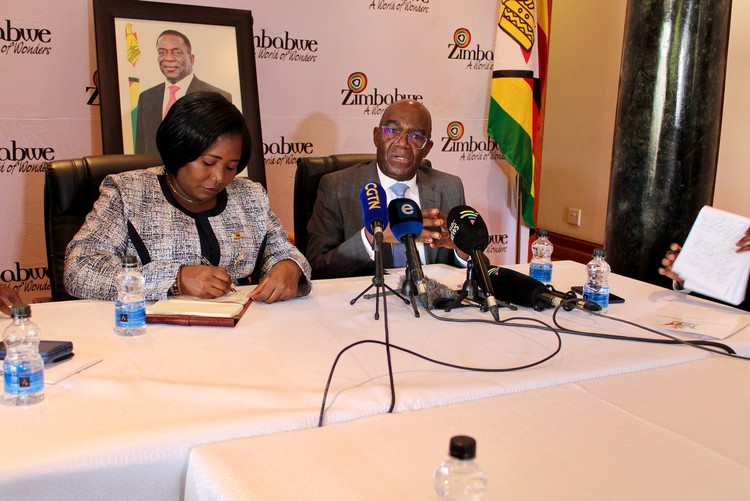Here’s what the Zimbabwean embassy says about the expiry of the ZEP
The ambassador encouraged voluntary repatriation. But he also criticised the way Zimbabweans are being denied public services in South Africa.
Zimbabwean Ambassador Hamadziripi and Consul General Melody Chaurura addressed the media on the return from South Africa of Zimbabwe Exemption Permit holders. Photo: Kimberly Mutandiro
Zimbabwe will facilitate the return from South Africa of holders of the Zimbabwe Exemption Permit (ZEP), due to expire on 30 June, Zimbabwean Ambassador David Hamadziripi told a media briefing at the embassy in Pretoria on Thursday.
In a decision criticised by ZEP holders and facing a legal challenge, the South African government decided not to renew the permits in 2021, gave the 180,000 ZEP holders a year grace ending 31 December 2022, and then gave an extension until 30 June 2023.
Since the decision, groups such as Operation Dudula have been increasingly targeting Zimbabweans and immigrants.
When asked about whether the embassy was aware of Zimbabweans being targeted and denied public services in South Africa, Hamadziripi said, “We are aware that Zimbabweans are being excluded from receiving public services in this country … We believe that this is not right. These individuals and those families do deserve to get that service.”
He said the embassy had raised the issue with the Department of International Relations and Corporations “that we would wish for those practices to stop”.
“On a specific case about Zimbabweans who were evicted from a building in Johannesburg recently, the consulate did dispatch a team,” he said. “We went there and interacted with the host authorities, including police. The government of Zimbabwe has provided funding to assist those individuals to return home, for those who do wish to go home.”
Hamadziripi said a “mapping exercise” to identify and register ZEP holders wishing to return will be conducted in February and March across all provinces, beginning with an online registration followed by physical visits.
Hamadziripi emphasised that repatriation was voluntary.
“We may have problems, but we have a country which has people in it,” said Hamadzirripi. “Zimbabwe has people as we speak, who are surviving, who live in the country. It’s very important that we acknowledge that. There are people who are going about their business like anyone else in any other country.”
He said the Zimbabwean government would waive custom duties for returnees. It would also provide transportation to rural homes.
Butholezwe Nyathi, from the African Development Consortium, said, “We should be realistic because there is no dignity in deportation; it’s better to voluntarily go home.”
Support independent journalism
Donate using Payfast

Don't miss out on the latest news
We respect your privacy, and promise we won't spam you.
Next: Dire shortage of school places for autistic children
Previous: Gqeberha shack dwellers demand houses after waiting 24 years
© 2023 GroundUp. This article is licensed under a Creative Commons Attribution-NoDerivatives 4.0 International License.
You may republish this article, so long as you credit the authors and GroundUp, and do not change the text. Please include a link back to the original article.
We put an invisible pixel in the article so that we can count traffic to republishers. All analytics tools are solely on our servers. We do not give our logs to any third party. Logs are deleted after two weeks. We do not use any IP address identifying information except to count regional traffic. We are solely interested in counting hits, not tracking users. If you republish, please do not delete the invisible pixel.

